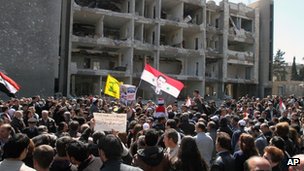Sergei Lavrov said President Bashar al-Assad’s regime had “responded incorrectly” from the start, when the protests were peaceful. He also said Moscow was prepared to support a UN resolution backing its envoy Kofi Annan’s peace plan. It comes a day after Russia called for a daily humanitarian ceasefire. Earlier on Tuesday, US campaign group Human Rights Watch (HRW) accused elements of Syria’s armed opposition of carrying out serious human rights abuses, including kidnapping, torture and execution.
‘Continuing efforts’
“We believe that the Syrian leadership responded incorrectly to the very first manifestations of the peaceful protests,” Mr Lavrov told Kommersant FM radio in a pre-recorded interview.
“The Syrian leadership – despite the numerous promises it has made in response to our calls – is making a lot of mistakes. Unfortunately this is why the conflict is so acute.”
Russia is a key ally of Syria and, along with China, has twice thwarted attempts to agree to a UN resolution condemning Mr Assad’s actions.
But observers believe Moscow’s patience with Damascus has been wearing thin.
Mr Annan, the UN-Arab League special envoy on Syria, has spent the last few weeks meeting all sides in the conflict – putting forward proposals to try and bring about an immediate ceasefire by both sides, access for humanitarian aid and the beginning of political dialogue.
Mr Lavrov, speaking at a news conference after meeting his Lebanese counterpart, said the UN Security Council should support the proposals, “not as an ultimatum, but as a basis of continuing efforts” by Mr Annan to find a solution to the crisis.
Following talks with the International Committee of the Red Cross (ICRC) on Monday, Mr Lavrov’s ministry put out a statement urging the Syrian government “and all armed groups who oppose it” to agree to ceasefires “without delay”.
The ministry said it supported the ICRC’s demands for a daily pause in fighting to evacuate the wounded from the worst affected areas and allow in food and medicine, and urged the Syrian authorities to give the organisation “access to all detained persons in Syria following the protests”.
Meanwhile, HRW has called on Syria’s main opposition coalition, the Syrian National Council (SNC), to condemn the abuses carried out by some of its supporters.
According to HRW, abuses include kidnapping for ransom, detention, and torture of security force members, government supporters, and people identified as members of pro-government militias, called Shabiha.
HRW has frequently accused Syria’s government of abuse over the past year of conflict.
The UN says more than 8,000 people have been killed in the year-long uprising, while tens of thousands of people have fled their homes.



















